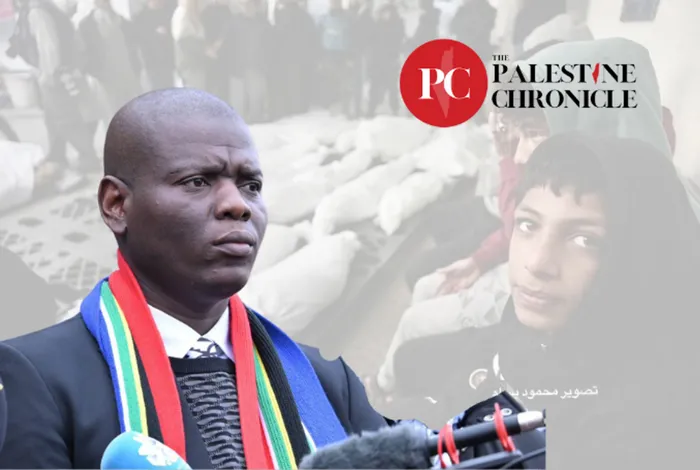SA Ministry of Justice: ‘This is why we are confident in our ICJ case’

By Nurah Tape and X
“It’s the World Court, so its judgments, (it) doesn’t get higher than that.” – Chrispin Phiri, spokesperson for SA’s Minister of Justice
South Africa is hopeful that the International Court of Justice (ICJ) will find that “the killing of on average 1,000 people per day” in the besieged Gaza Strip is reason enough to meet the demands set out in its submission to the Court.
Amongst the nine provisional measures that South Africa has called for, are most notably, that Israel immediately suspend any military operations in or against Gaza, and that humanitarian aid be allowed in as quickly as possible.
“It’s the World Court, so its judgments, (it) doesn’t get higher than that,” Chrispin Phiri, the spokesperson for South Africa’s Justice Minister Ronald Lamola, told The Palestine Chronicle.
Israel on trial at The Hague
Israel on trial at The Hague.
— 🍁 (@ZulkarnainAli_) January 11, 2024
Full video of oral argument of South Africa at the International Court of Justice in the case South Africa vs Israel in which South Africa accused Israel of genocide against #Palestinians in #Gaza. pic.twitter.com/mnIcoeDda2
“So we doubt that the Court wouldn’t find that the killing of at least, on average 1,000 people per day, is not something that isn’t an urgent condition that requires to be addressed,” said Chrispin Phiri.
The South African government brought the case against Israel on December 29, accusing it of “genocidal acts” in its military assaults on Gaza. The case was heard on January 11 in The Hague.
Describing the ICJ case as “a measure of last resort”, Phiri said, “we do not want to pre-empt the judgment”.
However, he added, “We would want to read the judgment and understand how it has reached its position. And once we are capable of understanding that, we would then respond accordingly.”
“In any event,” Phiri stressed, “the judgment would also have to be tabled at the United Nations Security Council, which will also then have to ensure that it is adequately enforced.”
Israel fails to ‘disprove SA’s compelling case’
"Israel has failed to disprove South Africa’s compelling case."
— Al Jazeera English (@AJEnglish) January 12, 2024
South Africa’s Minister of Justice Ronald Lamola told reporters at The Hague that nothing can justify the genocidal acts which Israel is committing in Gaza ⤵️ pic.twitter.com/PxMWoMlBLk
Asked what South Africa’s next step would be, should the Court not meet its requests, Phiri said, “We will really have to understand what the reasoning is, and then act in accordance with the reasoning.”
The spokesperson remains optimistic saying “we are hoping that the court will uphold what we required (listed) in our provisional measures” in particular, the conditions for a ceasefire and humanitarian aid be allowed in.
He said, “These are the most significant which we believe will have a long-lasting impact in the current conflict, but also to stop the killing that we are seeing.”
‘Evidence of Genocidal Intent’
Advocate Adila Hassim who opened the arguments at the ICJ said, “South Africa contends that Israel has transgressed Article II of the (Geneva) Convention, by committing actions that fall within the definition of acts of genocide. The actions show a systematic pattern of conduct from which genocide can be inferred.”
Another member of the legal team, Advocate Tembeka Ngcukaitobi submitted that “the evidence of genocidal intent” by Israel in Gaza “is not only chilling” but “also overwhelming and incontrovertible”.
Adila Hassim, a lawyer presenting South Africa’s Gaza genocide case at the ICJ, describes the Israeli regime’s 'unparalleled and unprecedented killing' of Palestinian people. pic.twitter.com/VdUXZVaOby
— PALESTINE ONLINE 🇵🇸 (@OnlinePalEng) January 11, 2024
Addressing the media after its submission in The Hague, Minister Lamola said that the case against Israel presents the ICJ with “an opportunity to act, in real time, to prevent genocide from continuing in Gaza”.
Israel has rejected as false the accusations of genocide brought by South Africa at the ICJ.
South Africa’s justice minister Ronald Lamola outlines the genocide case against the Israeli regime, as a landmark hearing opened today pic.twitter.com/deht4vDH1A
— Sarah Wilkinson (@swilkinsonbc) January 11, 2024
Tal Becker, the Israeli foreign ministry’s legal adviser, told the court that “If there were acts of genocide, they have been perpetrated against Israel”. Becker accused South Africa of “seeking to undermine Israel’s inherent right to defend itself”.
South Africa, a former apartheid state, has also referred Israel to the International Criminal Court (ICC) for alleged war crimes committed in its ongoing assault on Gaza.
According to Gaza’s Ministry of Health, 25,295 Palestinians have been killed, and 63,000 wounded in Israel’s ongoing genocide in Gaza starting on October 7.
Palestinian and international estimates say that the majority of those killed and wounded are women and children.
Nurah Tape is a South Africa-based journalist. She is an editor with The Palestine Chronicle.
This article was first published on The Palestine Chronicle